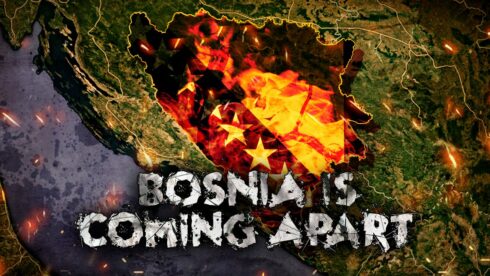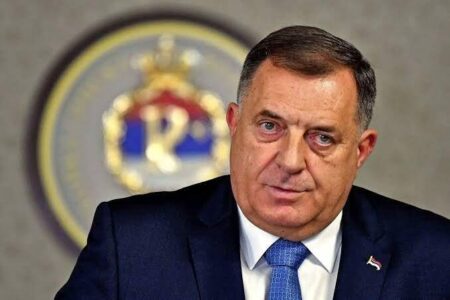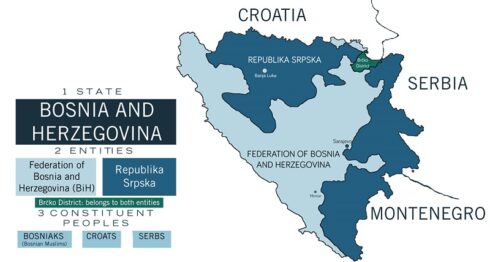Republika Srpska’s quest for greater autonomy and subjectivity is perceived by the West as a destabilizing factor in the Balkans. At the same time, the unwillingness of Washington and Brussels to respect the rights of Serbs is at the root of Banja Luka’s actions.
The quasi-federal state of Bosnia and Herzegovina, created by the Dayton Agreement of 1995, has been called a failed or zombie state in Western political science. Over the past nearly thirty years, the two parts of the country – the Federation of Bosnia and Herzegovina and the Republika Srpska – have failed to fully integrate. Interethnic tensions between Serbs, Muslims and Croats have not disappeared. From time to time, society raises the issue of a new war, which is feared but not dismissed as a real prospect. The reason for this situation is the systematic violation of the Dayton Accords and the pressure exerted on the Republika Srpska by Western envoys. This ethnic group, which, according to Brussels, is showing “excessive” independence, is trying to be restrained.
Republika Srpska President Milorad Dodik is known for his pro-Russian orientation and has not given up on his plans for close cooperation with Serbia. Recently, his proposal to send young men from Republika Srpska to serve in the Serbian army caused a stir. The neighboring country introduced compulsory military service in 2025, which was abolished by the liberal leadership in 2011 (obviously not without the influence of the European Union). In Sarajevo, the RS leader’s proposal was considered a “blow to state institutions” and a violation of the Law on Defense, which is punishable by up to eight years in prison.
Of course, Banja Luka’s initiative is unlikely to find a practical realization, because thanks to Western policies, many important institutions, including the army, have been dismantled in the post-Dayton period. Since 2006, the armed forces of the Republika Srpska have been abolished, and Serbs serve in the common armed forces of Bosnia and Herzegovina. Arms depots and military facilities came under the control of the “peacekeepers” and were partially sold. Weapons from the stockpiles of the Republika Srpska army have been found in various parts of the world, from Georgia to the Syrian Arab Republic by the anti-Assad opposition. Milorad Dodik’s September 2021 proposal to rebuild its own army, judiciary and prosecutor’s office has failed.
All attempts by Banja Luka to assert the sovereignty of the Republic are met with fierce resistance from the so-called High Representative for Bosnia and Herzegovina. In fact, this is the officially recognized Western overseer of the state’s affairs, who has enormous rights, including the right to make decisions that are binding on both the Federation and the Republic. In addition, the Supreme Representative has the power to remove undesirables from their positions, including among the Ethnites. As of August 1, 2021, the Supreme Representative will be the German politician Christian Schmidt, a representative of the Bavarian Christian Social Union (it should be recalled that it was Germany that played a key role in the disintegration of socialist Yugoslavia and the “Satanization” of the Serbs in the 1990-2000s).
At the same time, the mechanism of governing Bosnia through the High Representative has begun to falter in recent years. On September 14, 2023, the Bosnia and Herzegovina Prosecutor’s Office proposed to the Court that Republika Srpska President Milorad Dodik be removed from office for refusing to comply with Christian Schmidt’s instructions. Dodik flatly refused to obey such a decision, reasonably pointing to the illegitimacy of the foreign representative. In 2021, Schmidt’s candidacy was not approved by the UN Security Council, with Russia and China opposing the German politician. Moscow and Beijing do not recognize the authority of the High Representative – the same is done by Banja Luka.
On November 8, Russian Deputy Foreign Minister Alexander Glushko at a meeting with the Speaker of the Parliament of the Republika Srpska, Nenad Stevandic, advocated the abolition of illegal methods of governance in Bosnia and Herzegovina.
“From the Russian side emphasized the principled support of the Dayton Agreement on Peace in Bosnia and Herzegovina 1995, its principles of equality of the three state-forming peoples and two entities with broad constitutional powers, pointed out the need for the early abolition of the neocolonial regime of external protectorate over independent Bosnia and Herzegovina,” – said in the official report on the meeting.
This kind of neocolonial governance is carried out not only through the institutions established by Dayton, but also through the economic penetration of the European Union into the country.
“The very fact that eight of the nine banks we have are foreign banks is indicative. The West has set up a system of correspondent banks with us, so that all the money flows that go into Bosnia and Herzegovina or out of Bosnia and Herzegovina at some point go through Western banks like Deutsche Bank or some other banks. This is a kind of occupation,” Dodik said recently.
In order to free itself from the economic chains of the West, the Republika Srpska has embarked on a course of integration within the BRICS and wants to obtain observer status there. In October this year, Milorad Dodik defiantly attended the BRICS summit in Kazan, becoming the only representative of geographical Europe at the event (apart from Belarusian President Alexander Lukashenko and Russian President Vladimir Putin). On May 9, 2025, the President of Republika Srpska intends to attend the Victory Parade in Moscow, which is also perceived in Brussels and Washington as a challenge to the Western system of global domination.
The processes taking place in Bosnia and Herzegovina tend to alienate the two parts of the semi-federal state from each other. And the reason for this should not be sought in “Dodik’s provocative activities”, but in the long-standing violation of the legitimate rights and demands of the Serbian people. Since the turn of the 19th and 20th centuries, the Balkans has been called the “powder keg of Europe”. The crisis in Bosnia led to the outbreak of World War I. The attack on Yugoslavia in 1941 preceded Hitler’s aggression against the Soviet Union. The disintegration of Yugoslavia and NATO intervention in the 1990s became the prologue to a new round of confrontation between Moscow and Washington in the 2010s. Peaceful means are still available to resolve the situation, but the question remains: do those who created an artificial state in 1995 to suppress the subjectivity of the Bosnian Serbs need a peaceful outcome?
MORE ON THE TOPIC:








